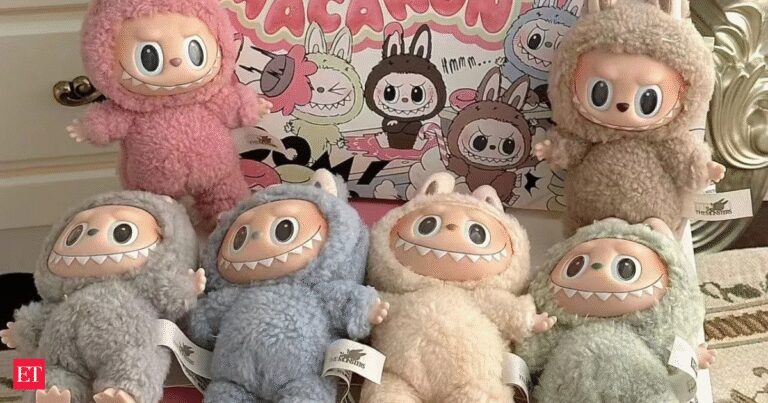These toys aren’t just cute. They’re currency.
What is Labubu, and why is everyone talking about it?
Labubu is part of a broader cast known as The Monsters, a fictional group created by Dutch-born Hong Kong illustrator Kasing Lung. First introduced in his Nordic mythology-inspired 2015 book series The Monsters Trilogy, Labubu is described by Pop Mart — the Chinese retail giant that now sells the dolls — as an “elvish creature” who is “kind-hearted and always wants to help, but often accidentally achieves the opposite.”
The character stands out with its crocodile smile, oversized eyes and ambiguous gender. “Labubu is a girl,” fans often clarify online. She isn’t a standalone figure either. She’s romantically linked to Tycoco, a vegetarian skeleton monster, and distinctly not involved with Zimomo, the actual leader of The Monsters who is often confused with her.
How a collectible became a status symbol
Labubu entered the vinyl toy scene in 2019 when Pop Mart licensed Lung’s characters into “blind box” collectibles — sealed packages that hide which toy design is inside. Selling for around $20–$30, these mystery boxes created an addictive treasure-hunt dynamic. Particularly sought after are the ultra-rare “secret” editions, with just a 1-in-72 chance of being found.
Fans have since flocked to social media to show off their unboxings. The hashtag #labubu has been used in more than 1 million posts worldwide, with over 32,000 of those in the US alone last week, according to TikTok analytics.Labubu’s popularity exploded after BLACKPINK’s Lisa was seen with one and spoke about her fondness for the doll in interviews and online posts. Rihanna and Dua Lipa soon followed, donning Labubu dolls like fashion statements. The toys even made a surprise appearance at Paris Fashion Week.
Sold out in seconds, sold online for thousands
With demand far outpacing supply, acquiring a Labubu has become a competitive sport. In many Pop Mart stores, shelves are often bare. At a Beijing mall, CNN found only display samples left in glass cabinets. “It’s almost impossible to get a Labubu via the official channels,” Pop Mart fan Evelyn Lin told CNN.
Re-sellers have stepped in to capitalise. Limited-edition Labubus have been listed on eBay for up to $7,000. On StockX, where buyers can place bids, some toys — including a collaboration with Vans — are fetching over $3,000. According to Cover News, blind boxes from the Labubu 3.0 series, initially priced at 584 yuan (₹7,000), are now reselling for up to 2,000 yuan (₹24,000).
Chaos in the queue, trouble at the border
Labubu mania isn’t all harmless fun. In the US, TikTok videos show people yelling and shoving in lines outside shops. One user called it the “Labubu Hunger Games,” describing a chaotic morning at a California mall during a product release.
Back in China — the home of Pop Mart and the dolls’ main manufacturing base — people are resorting to unorthodox means. At least 462 Labubu toys were recently confiscated by Chinese customs officials, who found them being smuggled in for resale. In one case, suitcases packed with Labubus were shown off at a press event like a drug bust.
“Because they are not available on official platforms, if you’re in a rush to get a gift for a friend, you just can’t manage to get the popular ones in time,” said Beijing-based fan Kate Yang. “You can only pay extra to buy from resale platforms.” She also revealed that her two most recent purchases from resellers were counterfeits.
A familiar trend: Fandom, overconsumption and online clout
Labubu isn’t the first — or the last — viral product to inspire mass hysteria. The phenomenon mirrors the Stanley Cup craze, which similarly saw lines, fights, and thefts for reusable drinkware. Like Stanley fans, Labubu buyers are now facing criticism over perceived overconsumption.
“I genuinely don’t believe that you people like that. You’re only buying it because other people are buying it,” said one TikTok user in a video liked over 350,000 times.
Another video, liked nearly 250,000 times, criticised bulk buying and reselling as part of a “hype machine” culture rather than genuine appreciation.
Despite the criticism, the numbers are hard to ignore. According to NBC News, The Monsters is now Pop Mart’s best-selling franchise, with $419 million in sales last year. Across all products, Pop Mart’s revenue in mainland China alone surged to $1.09 billion — a 34% jump from 2023. Its global gross profit rose by over 125%.
Labubu may be a small toy. But the world’s hunger for her is anything but.
And whether you’re in it for the art, the hype, or the hunt — Labubu has become a mirror of modern consumer culture. Small in size, enormous in impact.


